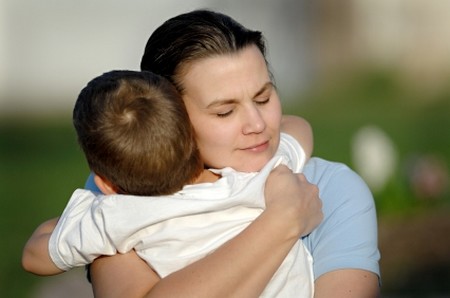A child’s feelings of guilt stem from his conscience, the part of his mind that tells him that he has broken a rule and that he should feel bad about it.
Conscience is not present at birth. A newborn baby has no sense of what is right and what is wrong, and doesn’t have guilt feelings. As far as a baby is concerned, if he wants something then he should get it. When he is hungry and desires more milk, he cries. He doesn’t care that he was fed just a few minutes ago, or that his parents are tired and need a rest. A baby only thinks of himself.
Parents are the prime influence on the development of their child’s conscience. From birth onwards, an infant begins to identify with his mother and father. Quite simply, he wants to be like them and he begins to behave like them. Identification goes further than this. As well as behaving like his parents, a child begins to think like them. He begins to adopt their attitudes and values, their feelings, and their moral views.
By the age of three, a child begins to experience guilt feelings when he does something wrong, because by then he is able to make elementary decisions about minor moral issues. For instance, should he play with a fragile glass ornament when he has been warned not to? He feels bad when he realizes he has broken a rule. Of course, breaking a rule is not good, but the child’s awareness of right and wrong—and the accompanying feeling of guilt—is a sign of satisfactory psychological development.
Within a few years, your child will have internalized many of your attitudes about right and wrong. This means that he knows how to behave even when you are not with him telling him what to do. Your conscience has become his. One indication of this is that he experiences guilt when he breaks rules.
Psychologists have studied guilt feelings in young children by placing them in situations that tempt them to break a rule. One classic investigation of this type used a large room that had a rabbit in a hutch in one corner and a pile of toys, comics, and candy in the opposite corner. One child at a time was taken into the room and was asked to watch the rabbit while the experimenter left for a few moments.
On no account, the child was strictly warned, should he leave the rabbit to go over to the “goodies” in the other corner. After several minutes, the inevitable happened—the lure of the toys and candy became too much. The child abandoned his assigned task of looking after the rabbit and instead wandered over to the goodies. As soon as he did that, the experimenter (who observed the child through a one-way mirror) pressed a switch that made the rabbit disappear down a concealed trapdoor.
When the child eventually returned to the corner with the hutch in it, he saw the rabbit was gone. At that precise moment, the experimenter burst into the room demanding to know what had happened to his rabbit. The children’s responses varied from total denial to reluctant admission and tears.
Through studies like this—along with detailed observations of children in a variety of natural settings—psychologists have identified a number of techniques to encourage the development of a healthy conscience:
- Explain rules to your child in terms he can understand. Simply telling him what the rules are will not encourage him to feel guilty when he breaks them; he should also be told why his action is wrong—for instance, because it upsets you, or because he might hurt someone.
- Make moral rules clear and specific. Instead of saying to a child who has just smashed his best friend’s toy car, “It’s not nice to upset people,” it would be more effective to say, “Don’t break someone else’s toys because she will cry and might break your toy in return.” Start with specific rules. As your child matures, he will be able to extend them himself to cover more general situations.
- React reasonably when your child misbehaves. The most effective type of punishment is that which is balanced against the seriousness of the offense. A punishment that is too extreme is likely to fuel your child’s resentment, rather than his guilt feelings.
- Never spank your child when he breaks moral rules. Research confirms that spanking a child for his wrongdoings doesn’t change his behavior. It simply encourages him to be more secretive in order to avoid punishment. It also reduces his feelings of guilt.
- Don’t put your child into situations that you know will tempt him. That only puts your child under unnecessary pressure. If you see that your child is about to do something wrong, step in and stop him before he does it.
